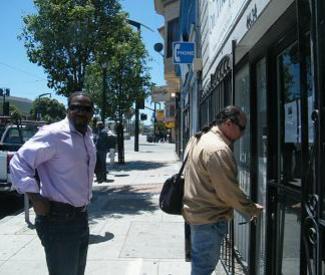Arc Ecology filed suit today in federal court against the San Francisco Redevelopment Agency, citing First Amendment issues and the Commission’s alleged retaliation for Arc’s criticism of the Agency’s Candlestick Point/ Hunters Point Shipyard project
Represented by attorneys from the First Amendment Project, Arc said the purpose of the suit is to hold the Redevelopment Commission accountable on two counts. First, for attaching an unconstitutional condition to the contract that requires silence from its contractors on matters of public concern outside the scope of the contract and second, for taking reprisal actions against Arc Ecology for its award-winning critique of the Candlestick Point Hunters Point Shipyard Redevelopment Plan.
Redevelopment commissioners threw Arc under the bus this September, when they rejected the recommendation of Agency staff, an independent interagency selection panel, the Hunters Point Citizens Advisory Committee and dozens of Bayview Hunters Point and San Francisco residents to rehire Arc to provide environmental technical and educational services for the cleanup of the shipyard.
At that same meeting, the Commissioners voted to award the contract to Circle Point, a San Francisco-based consulting company that Commissioner Francee Covington worked for, in support of a bridge project near Sacramento, several years earlier.
During the Commission’s Sept. 21 meeting, Commissioners Leroy King, Francee Covington and Darshan Singh joined Commission President Rick Swig in calling for Arc’s ouster, variously accusing Arc’s executive director Saul Bloom of disloyalty and dishonesty, but failing to support their claims with evidence related to the contract in question.
“I’m opposed to giving the contract to Arc,” Commissioner King said, accusing Bloom of talking, “against Lennar.” But Lennar is the developer for the city’s massive Candlestick Point/Shipyard project, and as such it is not in charge of the Navy’s clean-up of the shipyard.
Commissioner Covington pulled out the city’s response to comments on its EIR (environmental impact report) for Lennar’s redevelopment plans, as alleged evidence of Arc’s malfaisance, even though the non-profit’s Redevelopment contract involved assessing environmental issues related to the Navy’s shipyard clean-up, and not assessing rLennar’s redevelopment proposal.Covington then pointed to, but did not identify, letters she claimed were from individuals who alleged their names were falsely included in a letter supporting Arc’s EIR comments.
(The Guardian subsequently discovered that these missives were form letters. Both were written in identical language. Naim Harrison, who works for Positive Directions, which sent the city one of the form letters, told the Guardian that he signed Arc’s EIR letter, which asked for more time to review the city’s draft EIR. “It seemed a reasonable request,” Harrison said. But Positive Directions director Cedric Akbar, who sent the form complaint letters and was running as a candidate in the hotly contested D10 race, did not return the Guardian’s repeated calls.)
Commission President Swig, a hotel and tourism industry consultant, sought to frame Arc, which was hired as an independent non-profit, as an ungrateful consultant. “As a consultant myself, I don’t agree with all my customers, but I don’t bite the hand that feeds me,” Swig said.
Then the Commission voted 4-0 to reject Arc and award the contract to Circle Point, instead.
“The Redevelopment Commission’s punishment of Arc Ecology sends a message to all contractors that they must now lie for the Commission.” Bloom stated in a Dec. 6 press release. “Just listen to the Agency’s own web-audio of the Commission’s September 21st meeting. This unelected, unaccountable legislative body, one of only a handful of such Commissions in California, is attempting to put responsible criticism in the deep freeze.”
“No matter that the subject of our commentary was outside the scope of our contract, no matter that purpose of the contract was to provide the community with an independent view of the decision-making regarding the Shipyard’s cleanup, and no matter that its own staff found our analysis helpful, the Commission’s action states clearly they prefer public relations to transparency,” Bloom continued. “This is a governmental body with a duty to uphold speech not their private business. The Commission has given notice that to contract with the Agency be prepared to kiss the First Amendment goodbye.”
Arc and the First Amendment Project say their lawsuit will also demonstrate that the Office of Economic and Workforce Development “clearly biased the applicant evaluation score against Arc Ecology but failed in its attempt to rig the recommendation of the Selection Panel” and that the Redevelopment Commissioners “falsely stated the Commission’s policy as always awarding contracts to the highest scoring applicant – even if the difference is only two tenths of one percent out of a possible score of 100.”
First Amendment Project staff attorney Geoffrey King told the Guardian that Arc’s suit focuses on two distinct areas of concern.
“First, there was the attachment of an unconstitutional condition to Arc’s contract, and then there was the taking of retalitory action,” King said. “We allege that statements that Arc made were wholly outside the scope of its contract. But even if its statements were inside the scope of its contract, Arc was hired to be a watch dog and not a lap dog. Arc’s role within that process was to be an independent voice. You can’t condition funding on someone’s silence over something they were not contracting for.”
You could impose conditions like that, King says, if the government hired a public relations firm to disseminate an approved message.
‘That’s where you can control the content,” King said. “But if the government is hiring you to be independent, it can’t get mad at you for providing answers it doesn’t like.”
“And nobody accused Arc of a breach of the duty of loyalty,” King continued, noting that Bloom asked Redevelpment Agency staffers if he was in a breach, and was told that he was not.
“It’s pretty stark when you look at the transcripts of that Redvelopment Commission meeting what the real issue was,” King said.

